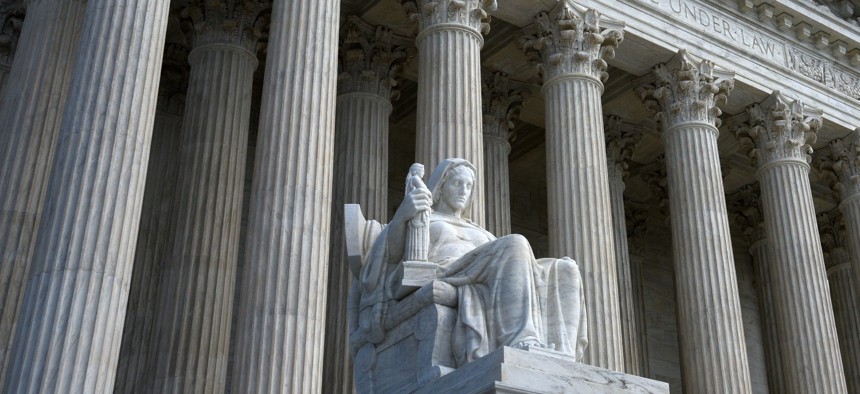SCOTUS stays out of contractor mandate case, for now

Robert Alexander / Getty Images
A special expedited hearing on the authority of two federal agencies to issue nationwide vaccine mandates covering nearly 100 million Americans does not touch on the authority to modify federal contracts to require vaccines for contract employees.
On Jan. 7, the Supreme Court will hear arguments in a special, expedited proceeding that will test the legal footing of the Biden administration’s COVID-19 vaccine mandates for private businesses of a certain size and for health care workers in facilities that accept Medicare and Medicaid payments.
Those two mandates, issued under the authority of the Occupational Safety and Health Administration at the Department of Labor and the Centers for Medicare and Medicaid Services at the Department of Health and Human Services respectively, cover an estimated 10 million healthcare workers and upwards of 80 million Americans who work at businesses that employ more than 100 people.
For federal contractors looking for clarity on the vaccine mandate scheduled to take effect on Jan. 18, however, the Supreme Court proceeding likely won’t offer much.
The vaccination mandate for federal contractors, currently suspended under a nationwide stay from a federal district court in Georgia, is not part of the Supreme Court case and is proceeding under its own schedule, with the next round of briefs and replies due in the first two weeks of the new year. That mandate, issued in a September executive order, covers federal contracts and subcontracts whose value is at or above the simplified acquisition threshold of $250,000.
Alan Chvotkin, a partner at the law firm of Nichols Liu and a longtime specialist in government contracting law, said the OSHA and CMS cases present different questions of law from those in the contractor mandate case.
“The question in OSHA and CMS is whether the agencies exceeded statutory authority,” Chvotkin told FCW. “That makes it a cleaner case for the Supreme Court to consider.”
The question posed in the contractor mandate has to do with the president’s authority under the Federal Property and Administrative Services Act.
“The president’s authority under the Property Act has been tested a number of times – sometimes it has been upheld, sometimes not,” Chvotkin said. “The challenge to the president’s authority to direct the issuance of a [Federal Acquisition Regulation] clause is a more difficult and complex challenge than the scope of delegation of statutory authority to an agency by Congress.”
There are additional layers of complexity in the contractor mandate case. The executive order requires covered contractors to impose masking and physical distancing requirements and to designate COVID-19 safety coordinators at covered workplaces. These were not directly challenged in the lawsuits that led to the stay of the mandate, and the U.S. government is seeking clarification on whether the injunction prohibits the implementation of these aspects of the order.
Additionally, the government is seeking clarification about whether the preliminary injunction blocks contracting companies who support the mandate to apply it to its own employees even though the federal government is not enforcing the requirement.
The requirement has largely been adopted in federal contracts, through inserting language into new contracts as well as getting contractors to agree bilaterally to the language in existing contracts.
According to a Dec. 9 declaration from Jeff Koses, the current head of governmentwide procurement policy at the General Services Administration, the agency “has reached bilateral modifications to add the clause to 16,540 contracts [representing] a 95.85% rate of agreement among [Federal Acquisition Service] contractors.”
Even this side issue raises thorny legal questions, Chvotkin pointed out. Many states have passed legislation explicitly prohibiting private companies from making COVID-19 vaccination a condition of employment. Absent the nationwide injunction, the federal contract mandates would hold sway over those state rules. Even with the injunction in place, Chvotkin said, “federal preemption would still apply even though the government can’t enforce the mandate,” but he noted that this is an issue that may itself be the subject of litigation.
NEXT STORY: White House formalizes 2.7% pay raise






